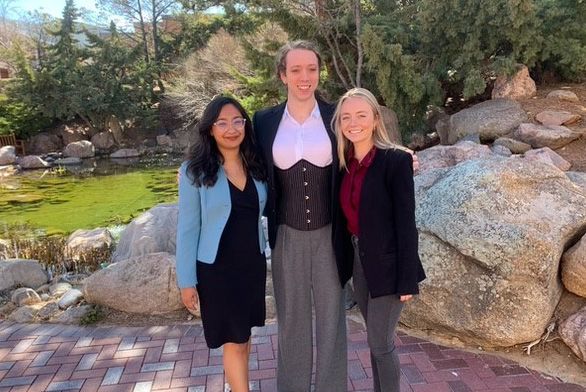Learning the Language of Business: Johnnie Team Attends Women’s Case Competition
May 5, 2022 | By Eve Tolpa

When Simran Thapa (SF22) heard about the University of Texas at Austin’s McCombs National Women’s Case Competition, she knew she wanted to find a way to participate.
“In the months leading up to graduation, I’ve been exploring different career paths,” says Thapa. “I’m interested in law, finance, and consulting. Case competitions are a great way to get a taste of what consulting would be like.”
The event was scheduled to be held virtually April 7–9, and Thapa’s first order of business was to put together a delegation. To that end she reached out to Charlie Bergman, director of the Office of Personal and Professional Development at Santa Fe, who oversees the SJC Consulting Club, the college’s nexus for students interested in consulting, business, and finance.
Bergman suggested Leah March (SF23), who in summer 2021 completed a course on global development at the London School of Economics through the Pathways Fellowship program; she had also recently participated with Thapa in a preceptorial on Justice Holmes’ common law and freedom of speech.
“I approached Leah, and it was a great fit because she has just started talking about a career in consulting,” says Thapa.
The team’s third member, Katherine Swift (SF22), had also been in the preceptorial. Though Swift says she’s “never had any interest in business,” she saw the competition as a way to practice problem solving—a skill she enjoys and “something that St. John’s is good at cultivating.”
UT’s McCombs School of Business usually requires a majority of case competition team members to be undergraduate business students, but the Johnnies noted in the registration form that they weren’t—and also wrote a separate email about how excited they were about participating. The requirement was waived.
March then sought help from people in various departments at St. John’s, who immediately stepped up to support the team. Vice President of Communications and Creative Strategy Carol Carpenter “sent us the school’s fonts, colors, and logo so we could use the college’s branding material in the presentation,” says Thapa.
The teammates also scheduled a lunch with Santa Fe campus president, Mark Roosevelt, who offered feedback and reached out to the community on their behalf. “Mark Roosevelt said, ‘Just do it—it’s ok if you don’t win. Just go and have fun and learn something,’” Thapa recalls. “It felt like the entire college stopped and helped.”
In a case competition, teams are provided with a hypothetical problem faced by a business and invited to present a solution. The 2022 competition was sponsored by Apple, and the company’s case focused on supply and distribution issues.
“It was regarding short- and long-term problems due to a weather event and how this event will affect delivery of their key products,” Thapa says. “Our task involved extracting information from different data sets. I found that the lab program prepared us well for this task.”
During the week, the three Johnnies were able to engage with Apple employees during office hours, which included “chats with recruiters about internships and jobs” at the company, says Thapa.
After a busy week of preparation, she, Swift, and March presented their case over Zoom during a 15-minute period, followed by five minutes of follow-up questions from Apple. “There was a lot of thinking on our feet,” Thapa says.
Says Swift, “I do think that critical thinking skills were on our side and that we were very capable of talking through the situation and solutions.”
“We weren’t as polished as the other teams,” Thapa adds. “It was a challenge, but we tried our best and gave it our all.”
Eight teams presented in the preliminary round, and the St. John’s team made it through the first round of four, with a final score of 72 out of 100. Says Thapa, “We were pleased with it and thought it was reflective of our hard work!”
“In the end,” says Swift, “what we needed was someone who knew the language and the format of the case competition.”
Still, says Thapa, “I learned so much. The case competition required problem solving that utilizes the skills we learn at St. John’s: close reading, analyzing data, asking questions. If we can learn ancient Greek, we can definitely learn how to speak the language of business.”

